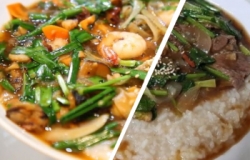
Deopjuk (Deopjuk), a small diner located in Pohang, featured in a TV program called Baek Jong-won’s Alley Restaurant, uploaded a post that enraged the public on Oct. 10. The diner revealed that there was a franchise restaurant that copied the recipe and the name of the dish to sell the exact menu that Deopjuk’s owner was selling.
Deopjuk mainly sold juk, Korean for porridge, with various selections of toppings similar to deopbap, which means rice covered in toppings. Deopjuk, a combination of juk and deopbap, was the outcome of the owner’s three-year-worth of trials and errors. According to the owner, she created more than 100 recipes in order to create the deopjuk she is selling today.
However, the owner was able to find out that there was a shop that there was another shop that used the term deopjuk in its store name. Furthermore, the shop intentionally expressed that the name of the dishes were copied.
Like Deopjuk’s case of food plagiarism, more victims gained spotlight. Sotteoksotteok, a Korean snack with skewered sausage and tteok, Korean for rice cake, was also in a plagiarism controversy.
The snack gained popularity after it was introduced in a famous TV program. One food manufacturing company created a new sotteoksotteok by using a sausage wrapped with rice cake. When the company sent its sample sotteoksotteok to a distribution enterprise, the enterprise snatched the snack and registered a patent to Korean Intellectual Property Office (KIPO) as if they were the creators.
Although the term plagiarism was used to refer to the series of recent appropriation of recipes, Korean law does not consider copying one’s recipe of a dish as “plagiarism”. Social journalist Jeon Yung-sun from JoongAng Daily examined why food recipes cannot be protected under intellectual property rights.
According to Jeon, Korean law considers recipes not as result of intellectual activity but as “ideas,” and ideas are not subject to protection under the Korean copyright law.
Chung Yeun-duk, a prominent professor of intellectual property rights at Konkuk University, explained that KIPO is not enough to protect the recipes.
“Say you obtained a patent for a recipe that you created,” Chung said. “Although that will be regarded as an intellectual property, there is nothing law can do when someone copies your recipe and change it by a little. For example, if someone takes your recipe but adds one pinch of salt at the end, this is considered not as plagiarism, but two different creations.”
Chung elaborated on how Korean law protects food recipes. According to Chung, people can claim their right over written recipes in a book or social media. But cooking a food based on a photo is not subject to legal protection.
“There is another law that prevents this kind of problems, called the Unfair Prevention and Trade Secret Protection Act,” Chung said. “This law states that if somebody plagiarizes a creation that resulted from someone’s hard work, that person will be punished.”
Yet due to its vagueness in defining “hard work,” the article is hardly applied in cases of plagiarism. According to Chung, conglomerates can invest a huge money to engrave their brand image to consumers via advertisement, whereas using big money for promotion is nearly impossible for small businesses.
“I am also aware that there was a controversy between cafes that trend on Instagram,” Chung said. “One shop claimed the other plagiarized the plating and decoration of its food. This kind of behavior is morally wrong, but it is not legally wrong.”
Considering this gap between public morality and the law, Chung advised that the food industry and shops should voluntarily try to refrain from using recipes and ideas that other people created or credit the source of their food.

